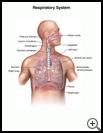
Pneumonia Discharge Information
What is pneumonia?
Pneumonia is infection of one or both of your lungs. The infection causes swelling (inflammation) of the air sacs in your lungs. The air sacs may fill with fluid or pus and cause you to cough or have trouble breathing. Pneumonia may be caused by a virus, bacteria, or fungus, and the infection may be mild or severe. You may be more at risk for a pneumonia infection if:
- You were sick with another illness and your immune system was unable to fight a second illness in your lungs
- You had an injury that damaged your lungs, such as a chest injury or breathing in smoke from a fire
- You have a chronic illness, such as diabetes, chronic bronchitis, or cancer. These and other illnesses can put you at risk for getting infections
- Your stomach contents (food or liquids) backed up into your esophagus and trachea and you breathed it into your lungs
- You have recently had surgery with general anesthesia
- You are over age 65. Children under age 2 are also at higher risk.
How can I take care of myself when I go home?
How long it takes to get better depends on the cause of your pneumonia, your treatment, how well you recover, your overall health, and any complications you may have. It is very important to follow your provider’s instructions in order to make a full recovery. The actions you take to take care of yourself when you have pneumonia may also help prevent future lung infections.
Management
- You will be given a list of medicines when you leave the hospital.
- Know your medicines. Know what they look like, how much you should take each time, how often you should take them, and why you take each one.
- Take your medicines exactly as your provider tells you to.
- Carry a list of your medicines in your wallet or purse. Include any nonprescription medicines and supplements on the list.
- Talk to your provider before you use any other medicines, including nonprescription medicines.
- Your provider may prescribe medicines to:
- Treat the infection
- Reduce fever
- Relax and open the airways
- Reduce swelling in your lungs
- Loosen the mucus in your lungs and help you cough it up
- Your provider may recommend other types of therapy to help relieve pain, other symptoms, or side effects of treatment.
- Drink enough fluids to keep your urine light yellow in color, unless you are told to limit fluids. This will help keep your mucus moist so you can cough it up easily.
- Use a humidifier to increase air moisture. Avoid steam vaporizers because they can cause burns.
- Follow the treatment plan your healthcare provider prescribes.
- Get a flu vaccination yearly to protect against the flu.
- Talk to your provider about the benefits of getting the pneumococcal vaccine if you have a chronic illness or are over age 65 and have not been vaccinated.
- Take care of your health. Try to get at least 7 to 9 hours of sleep each night. Eat a healthy diet and try to keep a healthy weight. If you smoke, try to quit. If you want to drink alcohol, ask your healthcare provider how much is safe for you to drink. Learn ways to manage stress. Exercise according to your healthcare provider's instructions.
Appointments
- Follow your provider's instructions for follow-up appointments.
- Keep appointments for any testing you may need.
Talk with your provider about any questions or concerns you have.
Call your healthcare provider if you have new or worsening:
Shortness of breath
- Chest pain when you take a breath
- Wheezing
- Coughing up mucus that is thick or blood-stained
- Fever higher than 101.5° F (38.6° C)
Last modified: 2016-02-18
Last reviewed: 2016-02-12

